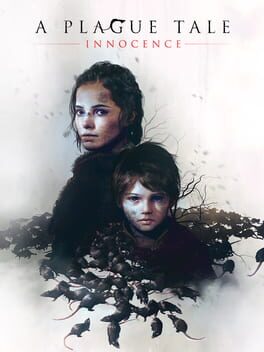Despite the fact that its robotic puzzle game mechanics fundamentally work at odds with the Lifelike world design and organic pacing (not to mention the ludicrous final act), A Plague Tale is so refreshingly humanistic I can't help but laud it as an overall effort. Amicia and the misfits she picks up along her journey to revive her sickened brother, are underdeveloped to a fault; writer, Sebastien Renard too often confuses building empathy for his characters with building sympathy. Also, it can be difficult to determine if the game is supposed to be a proponent of violence or critical towards it (Amicia's religious ethics are clouded by a developmental numbing to cruelty, confusing the game's principles).
But the moments that truly shine arrive whenever these children are faced with immediate danger, and are prompted to consider the chaos of the world outside the walls of their home, as they stare death in the face again and again. "Do we have to walk over them?" the boy, Hugo asks when the siblings are forced to venture across a battlefield littered with countless dead soldiers, a thick sheet of white obscuring the landscape like an ambiguous moral fog of war. "Does it hurt them?"
Few titles are as considerate of death as Asobo Studio's game, proposing existential rumination as an intrinsic process of growing up. The children's illustrious home and family are stripped away, sending them into mid-14th century wild France, where they meet a couple of penniless thieves constantly on the run, a young alchemist whose father is stricken by plague, and the burly, vengeful son of a blacksmith.
These characters are simple archetypes; however, by deconstructing typical fantasy RPG tropes, A Plague Tale examines the imaginative significance of the genre and the medium as a whole. Amicia acts like an heroic adventurer when the gang discover a ruined castle, flushing out the black, carnivorous, diseased rats to make a home out of the looming structure.
In many ways, the plot presents a progressive portrayal of rebirth, often linking alchemy to the role of a phoenix rising from ash. "Be brave, you can do this," each sibling will often say to their self when separated.
One ingenious sequence catalogues the villains' sinister operations as the player sneaks through an extensive gauntlet as wee Hugo, on a quest to free his captured mother. When he enters the chapel, it feels enormous and oppressive, but the game maligns not Christianity as a whole, but the corrupt men manipulating its moralistic practices. Faith is the foundation upon which civilization is erected. A plague has no motive, only heinous men do. The plague has taken lives and turned men into desperate monsters, but the meek shall inherit this ill earth.
But the moments that truly shine arrive whenever these children are faced with immediate danger, and are prompted to consider the chaos of the world outside the walls of their home, as they stare death in the face again and again. "Do we have to walk over them?" the boy, Hugo asks when the siblings are forced to venture across a battlefield littered with countless dead soldiers, a thick sheet of white obscuring the landscape like an ambiguous moral fog of war. "Does it hurt them?"
Few titles are as considerate of death as Asobo Studio's game, proposing existential rumination as an intrinsic process of growing up. The children's illustrious home and family are stripped away, sending them into mid-14th century wild France, where they meet a couple of penniless thieves constantly on the run, a young alchemist whose father is stricken by plague, and the burly, vengeful son of a blacksmith.
These characters are simple archetypes; however, by deconstructing typical fantasy RPG tropes, A Plague Tale examines the imaginative significance of the genre and the medium as a whole. Amicia acts like an heroic adventurer when the gang discover a ruined castle, flushing out the black, carnivorous, diseased rats to make a home out of the looming structure.
In many ways, the plot presents a progressive portrayal of rebirth, often linking alchemy to the role of a phoenix rising from ash. "Be brave, you can do this," each sibling will often say to their self when separated.
One ingenious sequence catalogues the villains' sinister operations as the player sneaks through an extensive gauntlet as wee Hugo, on a quest to free his captured mother. When he enters the chapel, it feels enormous and oppressive, but the game maligns not Christianity as a whole, but the corrupt men manipulating its moralistic practices. Faith is the foundation upon which civilization is erected. A plague has no motive, only heinous men do. The plague has taken lives and turned men into desperate monsters, but the meek shall inherit this ill earth.
